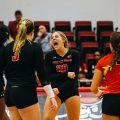When the first case of COVID-19 was announced in the United States by the Centers for Disease Control and Prevention (CDC) on Jan. 22, no one could have predicted that not even two months later it would turn into a global pandemic and change everyday life.
One of the most impacted groups of people during the pandemic has been athletes and, in the case of APSU, student-athletes.
From spring seasons canceled, to summer workouts done via zoom and even the postponement of full fall seasons, the coronavirus pandemic has affected the landscape of Governors athletics in seemingly every aspect.
On March 11, the World Health Organization (WHO) declared COVID-19 a global pandemic. Following the announcement, entire sports leagues and conferences across the country began to cancel the remainder of their seasons. Five days after the organization’s announcement, the Ohio Valley Conference Board of Presidents announced that, effective immediately, the remainder of all spring seasons were canceled.
Of APSU’s 15 athletic teams, seven had spring seasons come to an end after the OVC canceled competition. Many of the teams had vastly different reactions to the conference’s decision.
Baseball’s head coach Travis Janssen explained the cancellation as a “Surprise to everybody,” following his team’s season coming to an abrupt stop after just 17 games. He explained that he went out to lunch one day after a practice when he heard about the cancellation of the SEC and March Madness. By 4:30 that same afternoon, he was standing in front of his team telling them their season was over.
Tennis head coach Ross Brown said, “we were more disappointed,” and felt like both of his team’s had so much more to give, especially in his women’s program who was coming off a conference championship the year prior.
Whether it be baseball, softball, tennis, golf or beach volleyball, each team had their own experience of hearing the news that the pandemic had unprecedentedly ended their spring seasons.
While many were hopeful the virus would not affect the fall schedules, this was not the case. With cases continuing to grow exponentially across the country, the OVC decided it was too much of a risk to allow teams to compete. On Aug. 14, the conference announced that fall sports would have their season’s postponed and resumed in the spring.

NICHOLE BARNES | THE ALL STATE
Prior to the announcement, fans were hopeful for a fall season. But coaches of the teams were prepared for the postponement.
Cross country head coach Sarah-Emily Woodward said she was, “definitely prepared for it [after] seeing what other conferences had already done.” As for volleyball, Taylor Mott also expected the decision and made sure to prepare her athletes ahead of any official word coming from the conference.
With summer activities plagued by the virus, teams were not able to hold their normal offseason activities and were forced to find new ways to stay in shape and connected to their team.
One way that the women’s basketball team was able to do such was by organizing weekly workouts on zoom. Senior guard Tahanee Bennell said that the team “all got on zoom one day a week for 40 minutes and just did ball handling workouts together,” in order to both stay connected and ready for their season ahead.
If there is any silver lining to COVID-19 for student-athletes, it is that the NCAA granted an extra year of eligibility to those who had their season affected by the virus, which has been every party involved.
With the exception of men’s and women’s basketball – as the NCAA recently granted an additional year to winter sports on Oct. 14 – all teams at APSU have examples of athletes who are taking advantage of the extra year of eligibility.
For example, the team that men’s golf coach Robbie Wilson will be returning to the green in the spring is very similar to that of which teed off a year ago. Wilson was able to bring back last year’s senior class thanks to the NCAA’s recent decision.
Many teams have come up with comical names for the returning seniors. Stanfill and the softball team refer to them as “grannies,” while some teams refer to the returning graduates as “super seniors” and coach Wilson has called the returning seniors his “COVID seniors.” No matter the name, the ability to give students who have had their season affected by the pandemic another year allows for them to finish their collegiate career in a fairly normal fashion.
The extra year of eligibility has also allowed for teams to keep their veteran talent. While this can be a positive influence in-game, it is just as important off the field. Teams are able to keep many of the leaders to their team; this will prove to be valuable in a year where nothing is guaranteed and every game is questionable.
Whether a team had their spring season cut short last March, or if they plan to be playing their sport in the spring as opposed to the fall, each team has used the fall semester to prepare for their upcoming season.
In 2020, not much can be guaranteed, but if there could be one thing that could be made certain, it is that every APSU team is working hard to attain every student-athlete’s dream in Clarksville: an OVC title.








